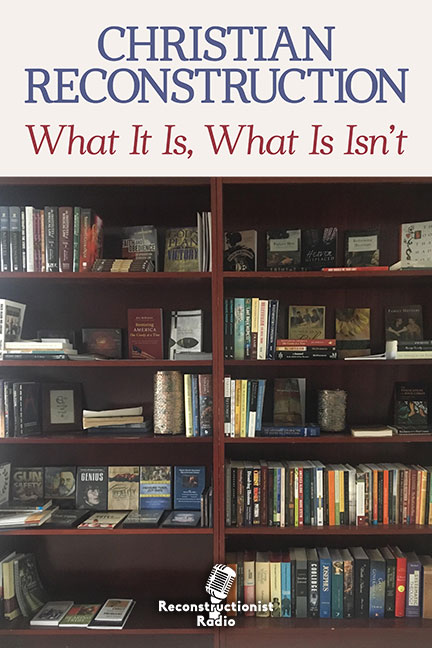
Part 1: Conclusion
Gary North and Gary Demar
Narrated By: Daniel Banuelos & Devan Lindsey
Book: Christian Reconstruction: What It Is, What It Isn’t
Topics: Doctrinal Studies
Subscribe to the Audiobook
iTunes Google Spotify RSS FeedChapter Text
Let us hear the conclusion of the whole matter: Fear God, and keep his commandments: for this is the whole duty of man. For God shall bring every work into judgment, with every secret thing, whether it be good, or whether it be evil.
Ecclesiastes 12:13-14
God will bring all of man’s works into judgment. Thus, we are to fear Him and keep His commandments. You might not initially imagine that these words of Solomon would be highly controversial, but they are, if a Christian Reconstructionist cites them as authoritative.
The Christian Reconstructionist believes that God’s judgments, like His free gift of sanctification to men and institutions, are threefold: definitive, progressive, and final. God brought definitive judgment against Adam in the garden and against
Jesus Christ on Calvary. He also brings progressive judgments in history against individuals and societies that rebel against Him: against the generation of Noah, the generation of the Tower of Babel, and Old Covenant Israel in 70 A.D. Babylon, Medo-Persia, Alexander’s empire, and Rome also fell. He will bring final judgment at the end of history. So, a basic aspect of evangelism is calling upon God to bring His negative sanctions against His enemies in history. Having churches pray the imprecatory psalms (e.g., Psalm 83) is an important and neglected aspect of evangelism. This means confrontation with God’s enemies and also with all those inside the camp of the saints who maintain a permanent cease-fire with humanism. We must work to break up the alliance before God’s judgments in history escalate.
The Alliance
The modern church does not believe that Solomon’s words apply to the New Testament era. They apply only to the final judgment. Non-Christians do not believe that the words will ever apply to man. Here we see the heart of the problem of both the modern church and modern humanism. Neither side takes Solomon’s words seriously. The humanist denies that God will bring anyone into judgment, either in time or eternity. Christians believe in God’s final judgment, but they are far less confident about His judgments in history.[1] They are also unwilling to say which commandments are still binding today, let alone in what specific ways.
So, there is today an operational alliance between the pietist churches and the humanists’ world order. Both sides implicitly agree not to raise the question of God’s commandments in public debate. Both sides are happy to debate the issues of the day apart from any reference to God’s law.[2]
This cozy alliance is today being challenged at every point by two developments: (1) the growing awareness in the thinking of a minority of Christian leaders and a majority of humanist leaders that there is an inevitable war between two New World Orders: Christ’s and autonomous man’s; (2) the theological system known as Christian Reconstruction, which for the first time in church history offers the biblical foundations of a comprehensive alternative to humanist civilization. I say “at every point” in order to make clear that I am not limiting my discussion to politics. The challenge of Christian Reconstructionism is much broader and far deeper than mere politics. Our concern is government, but not simply civil government. We begin our call for reconstruction with self-government under God. From there we go to church government, family government, and only then to civil government. My slogan is “politics fourth!”[3]
Biblical Alternative
Christian Reconstruction is a relatively small Christian intellectual movement which is now beginning to influence Christian activists. While it began in the United States in the late 1960’s, it is self-consciously internationalist in perspective, for its members believe that God calls the whole world to repentance.[4] Its theology provides the biblical support for the idea of Christian activism, political and otherwise. It teaches that every area of life apart from God’s healing grace is in sin, under Satan’s covenant, and therefore under God’s judgment, in history and eternity. Christian Reconstructionists therefore insist that the gospel of Christ’s salvation is comprehensive in scope.
The legal and moral principles of the gospel must be applied plainly and specifically to every area of life; the church must therefore speak prophetically. Just as the prophets of old came to the kings and people of ancient Israel, so do Christian Reconstructionists come to Christians today and non-Christians: to remind them of the four covenants of God. We are inescapably under God’s comprehensive covenant sanctions. Better to be under His positive sanctions than His negative sanctions, both in history and in eternity.
We Christians must proclaim this message of comprehensive redemption to the whole world. The whole creation longs to be released from the curse of sin (Romans 8:22-23), and only the gospel can provide this progressive release from sin and its effects, until God’s final judgment at last removes all curses from covenant-keepers and removes covenant-breakers from history, restoring His people and the creation to perfection.
No one individual and no institution can attain perfection in history, because of the effects of sin, but we are nevertheless required to work to achieve it. Perfection is our goal. “Be ye therefore perfect, even as your Father which is in heaven is perfect” (Matthew 5:48). This is a sufficiently large task to keep God’s church busy for at least a thousand more years.
[1] Gary North, Millennialism and Social Theory (Tyler, Texas: Institute for Christian Economics, 1990).
[2] See Chapter 9, above.
[3] Gary North, Political Polytheism: The Myth of Pluralism (Tyler, Texas: Institute for Christian Economics, 1989), p. 559.
[4] Gary North, Healer of the Nations: Biblical Blueprints for International Relations (Ft. Worth, Texas: Dominion Press, 1987).
